- Home
- Nichole Christoff
The Kill Shot Page 13
The Kill Shot Read online
Page 13
“Well,” I muttered to Philip, “apparently I didn’t make much of an impression.”
“On the contrary. You are a vision of the beauty of the night. It was your father who was less than impressive.”
“That’s too bad. Because I’d say John knows where the old man is.”
“Undoubtedly.”
Philip’s confirmation didn’t do anything to improve my mood. I knocked back the champagne John had ordered for me. It tasted like starlight, but it did nothing to lighten my spirits.
“Perhaps if we’re among the last of the guests to leave, our host might be more talkative,” Philip suggested.
“Maybe.” But I didn’t want to wait that long. “Or maybe I can learn a thing or two under the cover of this crush.”
I gestured to the partygoers cramming the room. There were bodies everywhere. Many were in silk, satin, or black tie. Still others were wearing those ridiculous bird costumes or enough spandex to outfit a dance troupe. Sourly, I hoped the performers were being paid well to appear in public like that.
“What do you intend to do?” Philip asked me.
“John lives here, doesn’t he? In this house? That means his laptop is here. And his cell phone. I could learn a lot from his cell phone.”
“Darling, even if you found a room full of his filing cabinets, men like our host don’t leave their dirty laundry where their guests can pick through it. Additionally, they don’t look kindly on guests wandering about the place. If you think John’s only security measures are the watchdogs outside, think again.”
I followed Philip’s line of sight, saw instantly what he meant. The pair of gentlemen strolling past the fireplace on my left weren’t gentlemen at all. The way their roving eyes sectioned the room was a little too familiar. And so were the telltale bulges, illegal in Britain, ruining the line of their tuxedo jackets.
“I don’t like the look of that fellow in particular.” Philip tipped his champagne flute toward one of the circulating waiters.
The guy’s grass-green coat made the most of his broad shoulders and the least of his trim waist, and the beak of his bird mask could’ve hidden a multitude of sins. But whatever he looked like, he sure listened well enough. From the way he took his time picking up the empties from the end table that just happened to be beside some of the old boys I’d hoped would know a thing or two about Armand Oujdad, I figured he was taking in every word they said.
And I didn’t like it.
Still, I said, “All the servers look like that. That’s the point of the uniform.”
“That may be, but many of them are bona fide security personnel, and there’s no point in drawing security’s notice.”
“Don’t worry. I can handle them.” I handed Philip my empty glass, treated him to a show-stopping grin. “I’m a security specialist, remember?”
Chapter 16
Shoving my square-rimmed glasses higher on the bridge of my nose and clutching my sparkling evening bag to my side, I left Philip to glower after me and sashayed behind a steady stream of waiters carrying away the detritus of the party. When they ducked behind a precisely placed palm, I did, too. But when they descended the wide sweep of the townhouse’s back stairs, whipping off their masks and breaking from their professional silence to compare notes and have a laugh at the fat cats John had assembled, I crept upward, toward the house’s third floor.
A swinging panel deposited me at the end of a long hallway, papered in a soothing beige print and studded with shaded brass wall sconces. Every few feet was a door. Before I could tap on the first one, I heard a stream of girly giggles.
“Oh, Georgie, I couldn’t!”
I moved on before Georgie could change his lady friend’s mind, and behind the second door, I found a vacant guest room.
Behind the third, one of the waiters lay across the bed’s moiré coverlet, a bottle of brandy curled to his chest and an empty one on the floor. He’d shoved his mask to the top of his head and its schnoz pointed north like a compass needle. I couldn’t quite make out the song he sang to himself, but the refrain sounded a lot like something from Duran Duran’s greatest hits collection.
I gave up on the doors on that side of the corridor, tiptoed across an Aubusson runner as thick as virgin forest, and selected the chamber at the end of the hall.
Bingo.
John’s master suite opened before me like an oyster on the half-shell. Like all rooms put together by professional designers, this one had a definite theme. I’d have said the theme was Nature Meets Nurture. Bookshelves fashioned from timber the color of driftwood lined the walls. They held books with titles in languages I couldn’t read and a collection of birds fashioned from bark and sticks. River stones, inlaid in the floor, carved out a path from the door to the desk.
I followed that path, hustling past the glassed-in gas fireplace that separated the sitting room from the sleeping area, and pounced on the bleached-wood desk positioned to overlook the London skyline out the windows. The drawers weren’t locked. I took that as a bad sign.
And a bad sign it was. My fingers made fast work of the desk’s contents, but I found nothing more than stationery, paper clips, and petty cash. I certainly didn’t find a postcard from Armand Oujdad.
Frustrated, I spun in John’s Aeron chair, took in the rest of the room. A couple of trinket boxes rested on the coffee table before a sofa in the middle of the room. They weren’t big enough to hide a smartphone, laptop, or tablet, though.
The sofa and table were positioned to get a good view of the large painting over the fireplace. It was a provocatively posed nude by an artist whose style I didn’t recognize. And I figured the painting hid John’s TV—but could it hide a safe instead?
I was in front of the portrait in an instant, had it moved in a second. Behind it slept a Sony flat screen. And that was all.
I rounded the fireplace with its row of burning jets, entered John’s bedroom. Along one wall was a wardrobe big enough to house all of Narnia and, on another, a matching dresser held toiletries and more birds, including a ratty-looking owl of twigs and berries. In the dead center of the room, a massive platform bed lay in a beech-wood surround. Nightstands flanked both sides of it. But from the archway, I could see a stack of papers, crowned with a fat fountain pen and a pair of reading glasses, on the far stand.
“Yes!” I murmured, congratulating myself.
But as I did, a glint crossed the glassy eye of the owl figurine.
And I froze. Because the eye of the bird was a camera lens. And apparently, it was sound-activated.
For all I knew, it was broadcasting a live feed. That meant somewhere in the building, a guy with a clipboard at a console wide enough to service the International Space Station was probably watching my every move. And reporting the breech of John’s bedroom to those who wouldn’t take too kindly to it—or to me.
For one long beat of my heart, I waited for a crew of goons to bust in and grab me.
When that didn’t happen, I hightailed it to the ballroom.
I found Philip holding down one end of the bar, sipping scotch.
He chuckled when he saw me. “Jamie, you look decidedly cross.”
“That’s funny. Really, I’m mad as hell.”
And I was. At myself. I’d made an amateur’s mistake. One that could’ve left a video recording documenting my presence in John’s room. Of course, with the way my luck was running, if more of John’s birds were wired for sound, I’d probably starred in a video as I’d tossed the great man’s desk, too.
I explained all this to Philip.
As I wrapped up my recitation, he covered my hand with his.
“Breathe, Jamie. No one’s rushing over to toss you out on your ear.”
He had a point. He also signaled the bartender. It was the same one who’d plied us with John’s special champagne—but I couldn’t sit still while the man poured me another glass of the bubbly stuff.
I hopped from my bar stool, started for the grand gallery—
and the exit.
Philip caught up with me, my champagne in one hand, his scotch in the other.
“We need to get out of here,” I told him.
“I agree.”
I looked past his shoulder to see if John’s henchmen were in hot pursuit. Thankfully, they weren’t. Yet.
Philip must’ve been thinking similar thoughts.
“Here.”
He handed me the champagne glass, pointed me toward a pair of Palladian French doors. The doors gave onto a narrow balcony. It hung on the side of the magnificent building, ran the length of the ballroom. Below, a private park waited in the blue moonlight. On the balcony itself, a collection of potted palms and tall rubber trees gave new meaning to the phrase “urban jungle.” And if the shifting shadows and low laughter were anything to go by, a number of John’s guests had sought their cover to steal a breath of fresh air, a smoke, or a kiss.
Philip extracted his cell phone from his breast pocket and called for his car.
“Now,” he murmured, slipping an arm around my waist, “we smile, we sip, and in less than ten minutes, we get the hell out of here.”
“I’ll drink to that.”
And I did. The champagne danced on my tongue. I closed my eyes, felt the chilled wine sparkle all the way down my throat.
“Do that again,” Philip said, and there was no mistaking the growl in his voice.
“No.” With a firm hand, I set the empty flute on the stone railing.
“Not even if I beg?”
I was too old and too sophisticated to blush when a handsome man flirted with me.
But I felt my cheeks heat all the same.
Philip turned me in his arms, drew me deeper into the shadows. “Say you haven’t learned where the old man is hiding. Say you’re not about to say goodbye.”
We were toe to toe, but I couldn’t see his face. It was cloaked in the dusk of the night. However, I could hear the yearning in his voice—and feel the quickening of my blood.
“Maybe,” I said, “you could come visit me in Virginia.”
“Or you could let the damn physicist fend for herself. You could remain in London.”
“No,” I said, trying to turn all this into a joke. “I’d miss the sunset over the Potomac.”
“Well, you’re here tonight,” Philip murmured, his mouth taking its sweet time brushing against my ear, “and I’ve got a splendid view of the sunrise at my flat.”
I bet he did.
And for one brief moment, I wondered what it would be like to let Philip make good on his promises. Would I regret it in the morning? Would I regret it ever?
But before I got tangled up in Philip’s sheets, my conscience reminded me there was Barrett to consider.
At least, that’s how it seemed when I’d left DC.
Here in London, however, Barrett had been like someone else. Someone secretive. And someone deadly.
Still, I couldn’t walk away from him. Because I was certain killing Dalmatovis hadn’t been his idea. And I sure as hell wasn’t going to see him rot in a UK prison for it.
So where did that leave me?
Before I could figure it out, Philip left my ear alone—and kissed my lips.
His kiss was bold and brazen and said much more than I’d been brave enough to hear.
But I wasn’t afraid. Not when he kissed me. So I reached for him, wrapped my uninjured arm around his neck.
Philip laughed low in his throat and kissed me again, deeper this time. And my fingertips began to tingle. So did my toes. I wanted to laugh at the sensation—until the tingling became a bristling that traveled along my limbs. It took up residence at the base of my brain.
I doubted the feeling had anything to do with Philip’s kiss.
And that began to scare me.
I put a palm to his lapel, pushed my way out of his arms.
“Darling, are you all right?”
“I—I just need some air.”
“Take a breath.”
The hum at the back of my brain made me do exactly as Philip said. But all the air on the balcony couldn’t clear the fog from my head. Or stop the buzzing of my brain stem.
I needed a minute. I needed to move. I stumbled into a bar of light spilling from the ballroom to cut across the balcony’s flagstone floor.
Philip’s hand wrapped around my arm. “Darling, you don’t want John’s security to see you this way. Come with me. The car should be downstairs by now.”
That buzz in my brainstem turned into a growl. It made me want to do exactly as Philip asked. Still, I knew I’d never make it to his car. I was sure of that. I shook off Philip’s hand, said something about the ladies’ room.
I blundered my way through the ballroom and into the gallery. There, one of the girls in the flame-red dresses directed me to a cloakroom. I crossed the threshold, gathered a vague impression of green marble and gold fixtures, and tripped toward a wash basin.
I splashed cold water on my overheated cheeks.
But it was too late.
My eyelids drooped. The room tilted when I tried to cross the floor. The gilded doorknob of the ladies’ lounge was the only thing keeping me vertical. I heard the titters of the ladies perched on overstuffed poufs in the middle of the room, patting powder on their faces and touching up their lipstick. They didn’t bother to hide their amusement when one of them confided, “Drunk.”
The woman’s whisper made the growl in my head grind into high gear. I wanted to follow her suggestion. I wanted to drink until I couldn’t drink anymore.
I was frightened.
But I wasn’t drunk. I couldn’t be. Sure, I’d had two shots of vodka in Philip’s car, but that was hours ago. I hadn’t had anything to drink since—except a single glass of John’s champagne before I’d searched his rooms.
And a single glass of champagne afterward.
John’s bartender had poured it for me after I’d triggered the video camera in John’s rooms. Philip had carried it for me to the balcony. And there I’d downed the whole thing.
But a couple of glasses of France’s finest surely wouldn’t do this to me.
Unless there’d been more in that second flute than the wine.
So my champagne had been drugged. It was the only explanation that seemed to make sense. But why would anyone want to drug me?
Because I was hell-bent on finding Armand Oujdad.
And because my host wanted him to stay lost.
Staggering into a stall, I stuck my index finger down my throat and tossed my cookies to the Porcelain God. Not that it helped. I still felt awful. And even worse, the world around me had begun to take on all the characteristics of a Warner Brothers’ Looney Toon.
I had to get out of here.
I had to find Philip.
I had to get help.
I shoved against the stall door. It bounced back like a sheet of rubber. Still, I found myself on the proper side of it. One of the women tittered as I staggered.
In the gallery, I saw no sign of Philip. I prayed he was waiting for me in the car. But the car seemed miles away.
My handbag dangled from my shoulder on its chain-link strap. My phone was in it, I knew. I’d phone Philip. I would. But the bag’s clasp was a jeweled rose. When I reached for it, the blossom’s petals gaped like the jaws of a bear trap and it gnashed its crystalline teeth. I recoiled, afraid for my fingers.
And that left me with one course of action.
I’d have to walk out on my own.
I tottered toward the sweeping staircase at the end of the hall. It undulated like a cartoon canine’s tongue. Elegant couples didn’t seem to notice as they traipsed up and down its steps.
But I did. I was trapped. And I was terrified.
Against my training as a private investigator, against my upbringing as a general’s daughter, and even against my very nature, I began to cry.
“Drink, miss?”
I jumped, startled by the hook-beaked bird who’d spoken to me. He was as big as a
man and just as bold. Instead of feathers, however, he wore a garish green jacket. As I tried my damndest to make sense of that, the memory of all those servers wandering through the party came rushing back to me. And then it hit me.
He was one of them.
Chapter 17
The waiter offered me his gilded tray. It flashed like a mirror in the sun. “Champagne, miss?”
The growl in my brain became a roar. And as if it had a mind of its own, my hand reached for a glass. Somehow, I managed to stop it.
“Miss?” The server bent closer. “Are you all right?”
Here among all these Brits, there was something strange about the waiter’s speech. Not that I could put my finger on it. He had an accent that sounded sort of like mine and I was still relatively sure I was an American. Which meant he was, too. But that didn’t make sense.
One idea did latch hold, though. This guy worked for John. And John had drugged me. So I couldn’t trust this guy. Not by a long shot.
I turned on my heel. I tried to get away. My knees folded like the legs of a cheap card table. The man’s tray clattered to the floor. He caught me as I crumpled.
He works for John, my mind screamed. John, John, John!
I slapped at the hand the man had wrapped around my waist, pried at the fingers gripping my arm, shoved at the mask covering his face.
But he wouldn’t let me go.
The waiter said, “Take it easy, honey.”
And just like that, I realized I was in Barrett’s arms.
He swept me off my feet, carried me like a bride toward the honeymoon suite. I couldn’t do a thing to stop him. He retreated along the gallery, bumped a panel in the endless wall with his hip. A hidden door swung open. And just like that, we were headed down the back stairs.
For no reason I could name, I began to giggle. “Drugged.”
“It’s worse than that.”
Barrett was probably right.
We emerged from the house through some kind of side door. Across the road, the private park I’d seen from above was as dark as the Forest of Dean. On the near side, the blue burn of street lamps left plenty of room for shadow. Parked cars crowded under the lights and were crammed against the curb. Something about their dark headlamps and quiet engines made me decide they were sleeping.

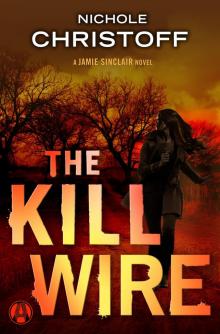 The Kill Wire
The Kill Wire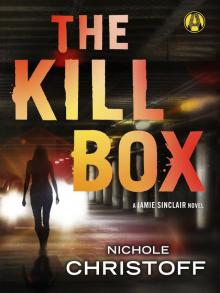 The Kill Box
The Kill Box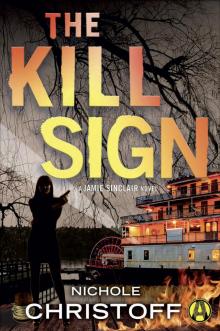 The Kill Radius
The Kill Radius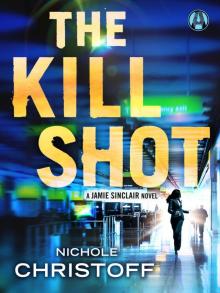 The Kill Shot
The Kill Shot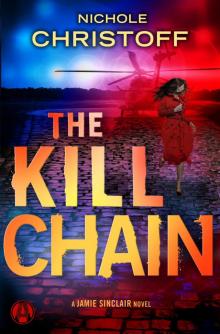 The Kill Chain
The Kill Chain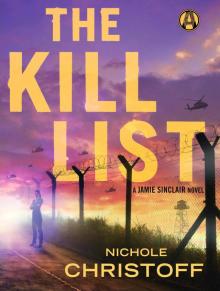 The Kill List
The Kill List